#character: neogriffith
Explore tagged Tumblr posts
Note
Hi! I love your meta and your understanding of Berserk is just so sublime. <3 I apologize that the ask is so long and I totally understand if you don't have the time to read it.
I was re-reading the post-Miura chapters and I noticed some details that got me thinking. Griffith seemingly decides to go to Casca after seeing/sensing the Beast of Darkness (2nd page of ch367, it's kinda ambiguous tho) and then when Guts fails to strike Griffith while Griffith is holding Casca, Guts thinks "Wha...?!", we see his hands shaking and he collapses. What do you think that he's so shocked about? That he couldn't hurt Griffith because of some magical invulnerability? Or because he couldn't bring himself do it after all? Or was he somehow surprised that he couldn't risk killing Casca too even if it meant killing Griffith (which would be unhinged but possible considering Guts' history with letting Casca die/suffer when it comes to Griffith)? Or maybe he was shocked to see Griffith holding Casca, since he was shown to have complicated feelings about that when Griffith first reincarnated and Casca reached for him and then after the Hill of Swords when Casca reached for him again. Of course, it was actually the baby she was reaching for but Guts doesn't know that and he was angsting about it pre-eclipse too (although apparently then it was fine cause he was pining after Griffith even harder and arguably he still is, lol). It would be interesting if it was also one of the reasons Guts was so upset when Griffith was carrying Casca away (hopefully along with, you know, the fact that Casca is being kidnapped by someone who raped her), and it could partly explain why Guts wasn't focused on saving her (and in fact, hasn't mentioned her once) but on feeling bad about himself instead. Poor Casca, she was thinking about how she needs to get back to Guts and Guts hasn't even thought about her.
And why do you think Griffith went to hold Casca and then took her with him? Did he think he needed something to stop Guts when he sensed the BoD? But that doesn't feel likely to me bc he was dodging Guts' attacks so effortlessly before. Or could it be possible that he somehow felt like he needed to protect Casca from BoD!Guts? Which obviously would be super ironic but he has protected Casca before (probably because of the Moonlight Child but who knows). He provabably has some reason to keep her in Falconia we don't know about yet, but I'm wondering what his immediate reasoning was since it doesn't seem to me that he came to Elfhelm to do that (or that he came there intentionally at all since he came as the Moonlight Child). As a side note, I also find interesting that Griffith has snapped Guts out of the BoD!mode twice. Once as the Moonlight Child (and the Moonlight Child also later saved Guts from drowning, both of these happened when the MC was in a form with Griffith-like hair) and once in Guts' mind (I think) when he almost got up from his post-Elfhelm depression through accepting the Beast of Darkness, although that might have been more about him feeling powerless against Griffith. Or maybe it was how he looked directly at Griffith's dick in that panel, who can say lol.
In addition, I think there are visual parallels between how Griffith reaches to Casca and how he reached to Ganishka, how Guts almost sliced through Jill to kill Rosine and how he almost killed Casca here, and Guts' strike and its "wind effect" look almost identical to what was shown in his fateful duel with Griffith, but I suppose it could be a coincidence or that the illustrators are using Miura's work as direct references.
Thanks if you read this far! I appreaciate all your contributions to the fandom <3.
Sorry about the wait, work's been a nightmare the past few weeks lol so I haven't had the energy for meta.
I actually have a post about that scene where I speculate about Guts' reaction. In brief, I figure it's shock at not being able to hurt Griffith, given his subsequent breakdown about his sword and total lack of thought for Casca (and yeah ia that sucks for her, wow) and it's interesting in context considering Griffith is essentially protecting Casca from him in that moment.
And that's an interesting point about Griffith potentially perceiving the Beast of Darkness in Guts. I've been assuming that Griffith kidnapped Casca basically just to have a babysitter nearby for the moonlight boy lol, so he wouldn't go magically wandering across the country looking for her, but it would be interesting if there was more to it than that.
I like to believe that maybe Moonbaby is a justification for an intrinsic urge to protect her that comes from his unfrozen human emotions. I hope that fact that Griffith had to shield her from Guts comes back, at least thematically - Guts as a danger to Casca has been a consistent theme throughout the latter part of the story, and Griffith being the one to protect her could be interesting as a sort of thematic yin yang thing, like Griffith as a monster demonstrating humanity vs Guts as a human demonstrating monstrousness.
Honestly idk why Griffith would protect her in terms of pragmatism. Surely her being dead would also help solve the moonlight boy issue by removing the person he seeks out. (Assuming that actually is his motivation and Griffith didn't kidnap her for some as yet unknown reason.)
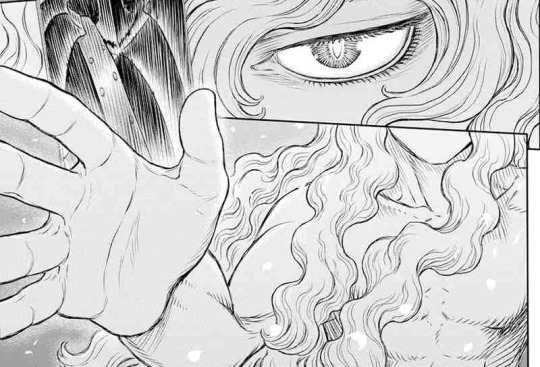
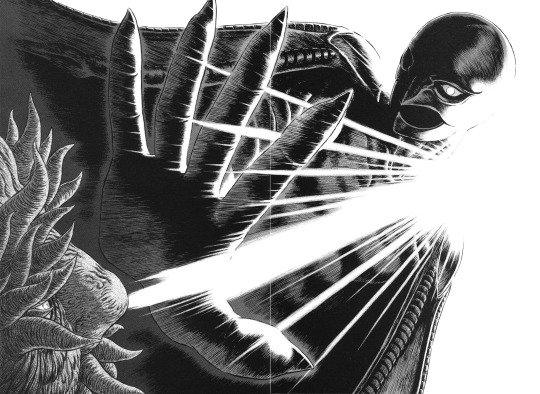
And ooh I did see the parallel between Guts and Rosine and Jill vs Guts and Griffith and Casca, which I get into in that post I linked, but I never considered a visual parallel between Griffith and Ganishka and Griffith and Casca, but yeah that makes sense and imo is potentially interesting thematically.
Like I see the Griffith and Ganishka encounter as a big high fantasy metaphor for a basic longing for human connection, and if Griffith and Casca mirror that at all then imo that's more evidence for Griffith being drawn to Casca because of his humanity and their former friendship, whether Griffith can admit that to himself or not. I mean, it could also be a suggestion that Moonlight Boy represents Griffith's humanity symbolically, but I don't like that concept (I want Griffith's human emotions to be real not symbolically expressed through a magic baby lol) so I'm all about finding alternatives.
Thanks for the ask, you raise a lot of good points!
#ask#saagadriel#a#b#theme: true light#theme: relationships as personal growth#scene: elfhelm#character: neogriffith
27 notes
·
View notes
Text
Yeah, I'm not going to touch on Femto or NeoGriffith tbh. Most of the time for interactions one will meet him During the Golden Age. Simply, I'm one of the few who believe Griffith died the moment he was tortured && essentially what we knew then is not what we know now.
#// I have two hundred chapters to go wish me luck#// once I'm done I'll genuinely write omg sorry#// but yeah I find him to be dead during the eclipse since the sacrifice also means you#// letting go of humanity to become a demon#// neogriffith just pisses me off too omg I GET THE NARRATIVE but man#// he's dead so....#𝐧𝐨𝐭 𝐭𝐡𝐞 𝐜𝐡𝐚𝐫𝐜𝐡𝐨𝐨𝐜𝐡𝐢𝐞 𝐛𝐨𝐚𝐫𝐝! (out of character.)#// zodd and the skull knight are so cool wowwww
0 notes
Text
griffith von berserk (specifically neogriffith von berserk) makes me giggle because he wants So Badly to be over guts. he wants to be over guts so bad it makes him look stupid. he's got his fiancée who he doesn't love and his kingdom that he nearly gave up all for this one (1) man and he blames any emotions he has left on the magic baby that's infused with his reborn flesh vessel. truly one of the characters of all time.
147 notes
·
View notes
Text
yes-this-is-most-likely-due-to-miura's-artstyle-changing, but i still find it so delightfully eerie how neogriffith is clearly so much more perfected and ethereal and sort of artificial than golden age griffith, yet every character says he looks exactly the way he used to. really sticks it in your face how much people idolise him lol
#it really irked me on my first readthrough tho#“he looks exactly the same” no guts he doesn't? what are you on about
3 notes
·
View notes
Note
Fic authors self rec! When you get this, reply with your favorite five fics that you've written, then pass on to at least five other writers. Let’s spread the self-love 🤍
I am the absolute least prolific writer of all time, so five is a massive chunk of my output in the past 15 years, lmao. And everything before that is like in the dust bin of history. BUT OKAY LET'S DO IT.
The Painted Stage: I think this is my most popular one? It's probably my favorite premise among all my various things. I also have very fond memories of staying up until like 10am on Valentine's Day trying to finish this one on time. What happens when you turn Berserk into more of a Devilman fanfic than it already is. [Berserk, Griffith/Guts]
When the Feast Is Over: I had a hard time deciding between this and Sail the Ocean Round, which is kind of a sister fic to this the way Painted Stage is a sister fic to When Night Comes Down. Dio AU from hell. [JJBA, Dio/Jonathan]
Before the World Falls Down: Until very recently this was the longest thing I'd ever written. Trivia. Anyway, this was my one and only Buffy fanfic and a bit of a thesis statement on what I loved about the series. It's OOOLD and it was completely random even when I wrote it since I've never actually been in the Buffy fandom. Romance and the Apocalypse. [BtVS/AtS, Buffy/Angel/End of Days]
Recoil & Grace: I'm not a big modern AU Berserk person, so I have no idea where this came from. I'll always be proud of myself for this one, though, because it was very technically challenging to pull off. It was also one of the rare times I've written substantial Griffith POV sections, and he's my favorite character to write, so. Regrets, Romance, and Reincarnation. [Berserk, Griffith/Guts]
When Night Comes Down: Is it recency bias? Is it because it ate 6 months of my life and messed up my fandom routine so badly I still haven't recovered and I desperately want to believe it was worth it? Maybe. It's still the one I'd write a sequel to if I wanted to write a sequel and felt like dealing with NeoGriffith discourse. Monster love story. [Berserk, Griffith/Guts]
THANK YOU VERY MUCH FOR ASKING. That was fun, ahah.
20 notes
·
View notes
Note
What do you think of the Skullknight? The fandom thinks of him as protoGuts, for good reason because of the berserker armor parallels, but his current form with him on a horse screams neoGriffith to me
I wonder if at this point we will ever get the full backstory for this character. But I don’t think it’s quite necessary to have a definitive confirmation for saying that Skull Knight is meant to represent the legendary Gaiseric, who was called the Skull King or the King of Galloping Death. In chapter 53, Thousand-Year Fiefdom, when Charlotte is recounting the tale of the origins of Midland, the depiction of Gaiseric reminds Guts of two different people: Griffith, like you said, especially because Gaiseric was a powerful leader that didn’t have a known origin (or proper lineage recorded by historians). But at the mention of Gaiseric’s appearance and helmet, Guts entertains for a moment the thought that he had met this legendary figure in the form of the Skull Knight.
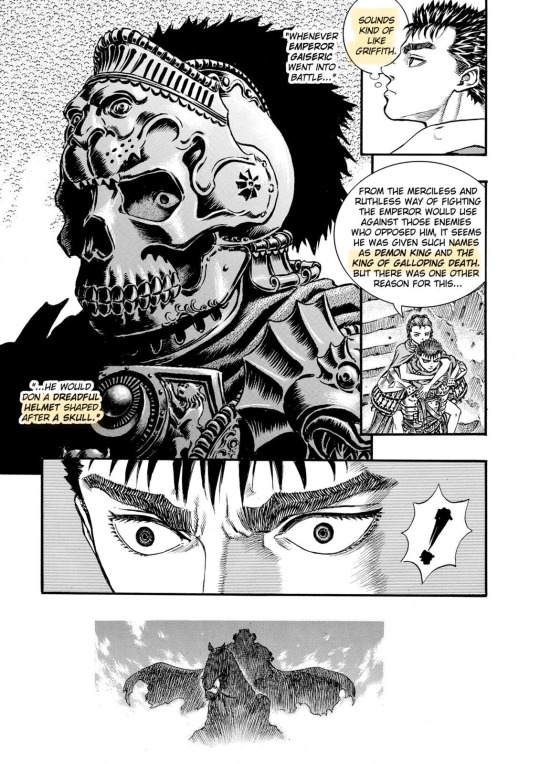
It’s through Guts that Miura compares Gaiseric to Griffith, although at this point it’s only Griffith’s potential that Guts understands as rivaling the great leaders of the legendary past. In a previous post I entertained also the idea that Skull Knight was an apostle that at some point opposed the God Hand, probably when Void became one of the five angels. But that is all speculation that can’t be confirmed. The parallels with Griffith are interesting to consider, I agree with you, but I also believe that Griffith and Guts are meant to mirror each other, as two sides of the same coin, and that their opposition is something that needs fuel because they would not have been opposite. Guts’s all story revolves around this tension towards becoming like Griffith and defeating him, in a call to power that again is similar to Griffith’s need to succeed at all cost. And this is where the berserker armor becomes an interesting tool, as something a little more meaningful than a power up for Guts, who is still a human with supernatural opponents: the berserker armor has the potential of divesting its wearer of everything that makes them human. The berserker armor is a concrete object that also reminds us of the beast of darkness, Guts’s shadow, his darkest impulses and motivations, and all the negative emotions, like the desire for revenge that surpasses any affection for Casca. The result seems similar to what has become of Griffith: only his desires, his dream has survived, but his humanity is buried. Skull Knight is again more similar to Griffith in this regard as well, he doesn’t seem really alive. Being it a beherit or a magical armor, the source of power seems to come from the same place where negative emotions are harnessed and exploited, instead of laid to rest.
Here is another post where I have talked about my own thoughts about Skull Knight at length, for example:
if you look at the cover page of chapter 37, which is the one that introduces Skull Knight as a character in the story, you’ll see an illustration of a skull with one eye socket empty and the other one with an eye looking at us, a crown of thorns with a rose (it’s the shoujo manga’s rose to me) and the top part of the cranium is fractured and edged inside is an awakening beherit. (…)
At the beginning of the next volume, no. 14, we have chapter 92 “Demon infant" (幼魔, Yōma), when Guts asks Skull Knight who he is, he answers: “I am the enemy of the inhumans”. Inhuman, demonkind or evil spirits seem to indicate all those who exist out of place, neither alive nor dead. And if Skull Knight wants to eliminate them in a way he is a proponent of a more “perfect death” that eliminates the residual energy that keeps the spirits tethered to the livings, wanting to prey on life. Components of the energy are after all primarily hatred, pain lingering along from their past lives, and injustices, resentments, vengeful desires. So it is a battle between Death and Immortality, because the immortals feed on those who are still living, Apostles included. So it’s more interesting to me this possibility of a double reading: Skull Knight having a specific history and a selfish reason to pursue Void and the God Hand, but also transcending it and becoming an incarnation of death.
1 note
·
View note
Text
Getting ready to drag Miura through the mud with my next Casca essay lol because 1. He deserves it 2. My friends are sick of hearing me complain about him and 3. I reread the eclipse and I can’t forgive him for that awful scene that breaks the immersion. Seriously. You wrote your ass to get to that part of the arc and you fuck it up that bad?
#berserk#casca#if you are gonna make me feel a way about a character#commit to it#i can’t even hate Femto like I want to because my rage goes to the author and the way he framed that scene#i want to feel contradictory feelings for NeoGriffith and ship GriffGuts with more guilt but#every time I get to that part of the casca scene in eclipse I go “oh right#that time Miura’s writing sucked
8 notes
·
View notes
Text
Reading for Redemption in Post-Golden Age Berserk
Below is some rambling thematic/character analysis and vague gay flapping about how Berserk could have *ahem* or should have ended. So please enjoy my little theory brain working on overdrive again (if you like) as I discuss how Griffith and Guts’s relationship could have been resolved through one decisive act... No it’s not killing Griffith, get out of here!
To follow are some ideas including (pearl clutch):
Griffith’s “redemption”
An act of love between Guts and Griffith
Guts becoming a shield instead of a sword as the culmination of his character arc
A second (!) sacrifice
This is a bit of a grasping-at-straws deep-dive into post-GA Berserk, but one that is I think actually surprisingly well-substantiated, that is if you’re willing to follow me into the vague realm of thematic parallels. For those of you who were unsatisfied with the way this latter part of the story treated G&G's relationship, I hope you might especially enjoy it.
Caution: I’m basically reading the entire post-GA story through the lens of Griffith and Guts’s relationship, because to me that’s the emotional and narrative heart of the story. I think we can in fact view a lot of post-GA relationships and characters through this lens, and the story becomes, imo, richer for it. Think Jill and Rosine, Serpico and Farnese, just for some easy ones.
Please keep in mind that this is obviously 1000% empty speculation and useless headcanon at this point, and it relies on drawing connections between seemingly disconnected scenes and characters, but it’s fun to think through this stuff, so I hope you enjoy this little journey into my sad gay heart and hopefully it’ll at least give you some food for thought by the end.
I’m also relying on previous meta written by myself and @bthump, so if you feel you’re missing context for any of this, please check out my previous two metas and basically bthump’s entire archive (an intimidating prospect that I assure you is totally worth it).
For all those simply interested in “Guts chops off Griffith’s stupid head”-esque discussions... Well, you’re welcome to stay... but strap in.
Part 1, On Post-Eclipse Griffith: Griffith Needs to be “Redeemed,” But What Does That Actually Mean?
The way I read NeoGriffith, and basically every moment post-Eclipse for Griffith generally, is that he is living his own personal hell. He is lonely, he is miserable, he’s playing prince charming in an empty and unfulfilling (heterosexual) relationship with Charlotte. He is loved and adored by everyone around him, he is the bearer of light, but I think it’s clear that in spite of this (and perhaps because of it) he still hates himself.
His last act as a human soul was to destroy himself by destroying those around him, and that moment was crystallized into the form of Femto.
And indeed, that shadowy other half remains very much present post-Eclipse. Femto and NeoGriffith are shown to be inextricable mirrors: the charming outward persona and the festering self-hatred beneath the mask. The two are halves of the same coin – Griffith’s two coping mechanisms, forever intertwined after the Eclipse.
We see this at play in “Backlighting” especially, where it’s made clear that Femto is always “with” NeoGriffith.


(Chapter 303, “Backlighting”)
(And side note, I hope to eventually post another meta about this motif of light/darkness in post-GA Berserk at some point… probably in like three years or something given my posting history lol)
In addition to this continued presence of Femto as an embodiment of Griffith’s self-loathing, we are also clearly shown his loneliness as NeoGriffith, and also his dissatisfaction with his life, in every panel where we see him standing alone/isolated from his new Band of the Hawk.
However – and this is where I begin my pitch for reading the entirety of Berserk through the Guts x Griffith lens – I think his mindset is also communicated to us as reader indirectly, through the voice of a different character entirely: the Pontiff. A minor character to be sure, but take a look at his inner monologue in Chapter 264. It’s both visually and rhetorically associated with Griffith.
See the parallels in the theme of repression of personal desires, a zealotry-based leadership role, light/darkness interplay and mirroring, castle and hawk wings imagery, and an assertion of worthlessness:
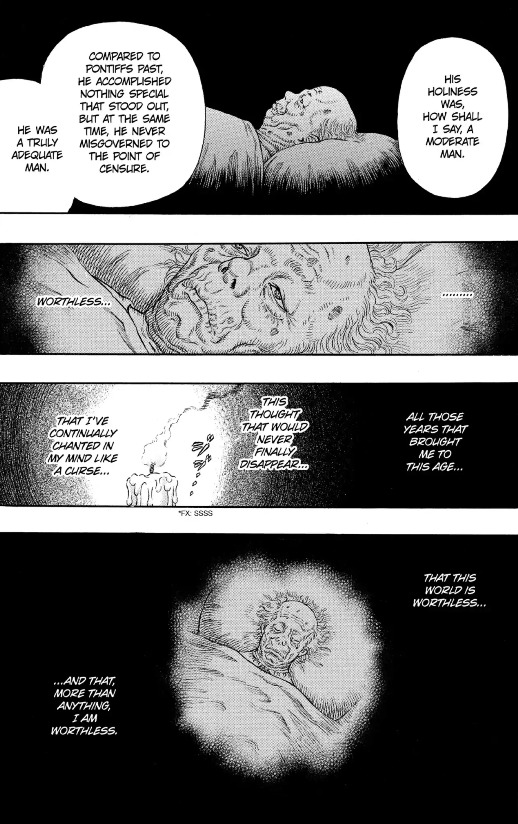
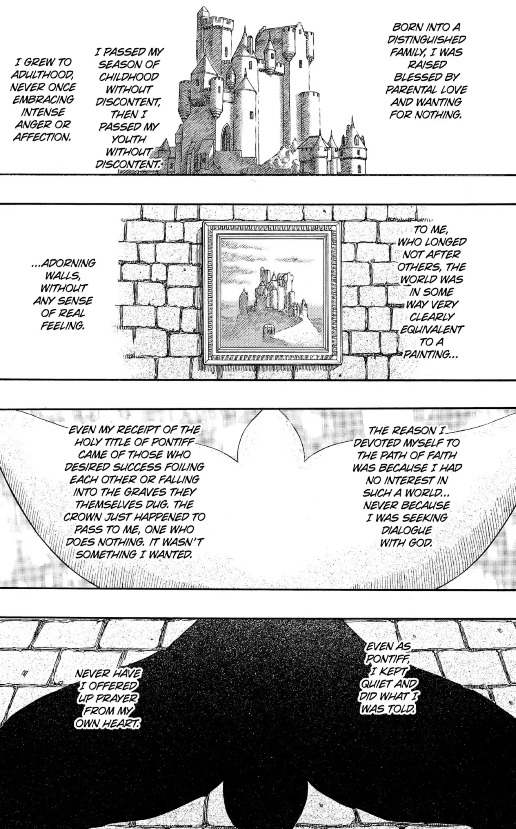
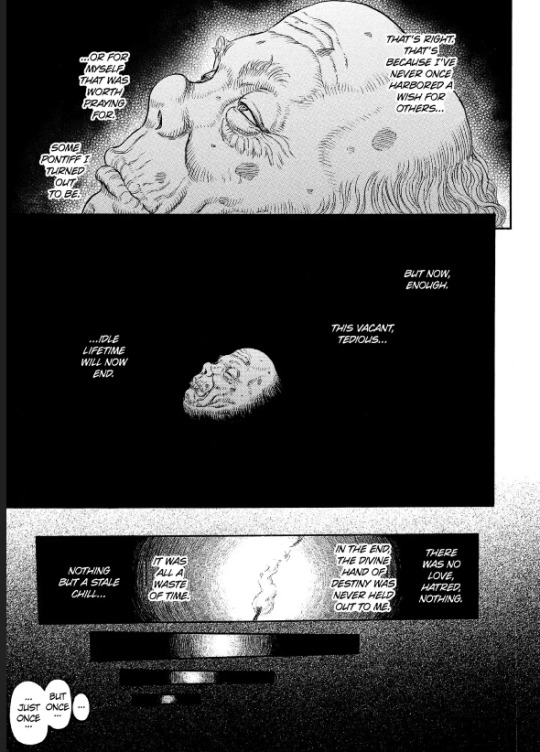
(Chapter 264, “Divine Revelation”)
Tell me that doesn’t sound suspiciously similar to someone else we know!
Now this is the type of thing that I find post-GA Berserk does a lot – it gives us these highly emotional moments about characters we really don’t know or care very much about as readers. It can lead to a bit of disconnect and feeling that the story has cheapened itself by highlighting these random characters. However, at least for me, this recurring pattern can be recontextualized by reading these charged moments as analogues for other characters, in that they are giving us insight through parallels with characters we know and care more about. I realize there is no in-text justification for doing this, but it provides a richer post-GA reading experience, at least for me, and hopefully for some of you as well.
So, through the Pontiff, I think we’re being granted a small glimpse into what Griffith might be feeling in his new life. Lest you think I am grasping at straws, which I totally am, nevertheless I offer you this: to Griffith too, the world in his new life has become a pretty painting, a castle on the wall, but he is left cold and lonely, stranded in the dark. “There was no love, hatred, nothing.” The absence of everything, specifically his everything, the world-shattering pain and love that Guts represents for him, remains a void in Griffith’s life.
(And as a bonus, also note the scene’s prominent light/dark reflection of the black and white Hawk – i.e., Femto and NeoGriffith, as visually paired and inverse)
Now, what does this have to do with Griffith’s capacity for “redemption”? Well, according to my previous readings of Griffith’s motivations behind sacrificing Guts and the Hawks, I do not believe that he feels any remorse or regret about the sacrifice. That’s because in order to feel regret, he would have to believe that both:
There was another choice he could have made
He deserves to feel something other than pain
I would offer that regret doesn’t belong in a headspace where Griffith thinks he is currently paying the price for his actions – with his emptiness, eternal suffering, repression, self harm, all of it. His life as NeoGriffith is, for him, both imprisonment and penance – it is the embodiment of the idea that he has to live as a monster. This is him reaping what he’s sown, "bear[ing] his evil and confront[ing] his destiny" as Void puts it.
In other words, he can’t regret his decision because he’s living with what he thinks he deserves. To admit otherwise is to admit that he doesn’t deserve this torment, which should be unthinkable to someone who still wears his self-loathing as a literal suit of armour.
And yes this perspective is extremely selfish, it’s not seeing the world from the perspective of those who he has harmed by his actions, but, evidently, that’s what self-loathing can do to people.
To conclude Griffith’s arc in a satisfying way, I would have liked to see him confront his actions, to experience regret, to repent from a non-selfish perspective. However, to do so, he would have to finally see himself as someone worthy of being loved, and to recognize that he in fact was that person once. That the sacrifice was a mistake after all, because he was loved by Guts all along.
The story has set up the fact that Griffith still absolutely needs Guts. Griffith at his most traumatized, at his moment of greatest despair needed (and now still needs) help to escape from the hell he’s living and thinks he deserves. And it’s all because he’s the victim of a misunderstanding that has led him to mistakenly believe he was never loved and was never worthy of love.
He chose the sacrifice because he was told by the Godhand that he is too dirty, too evil, to be redeemed or to be loved, in spite of Guts loving him all along. This is the belief that tore their relationship (and the world) apart. And it was a mistaken one! Guts is the one with the ability and the willingness to give him that: to right that narrative wrong. From this perspective, the only thing that will “save” Griffith, to allow him to repent and acknowledge what he’s done was a mistake, is an expression of love from Guts.
Now, I would have believed that this ending was unlikely or impossible except for the fact that Guts is not only aware that he fucked up with Griffith and is consumed with regret over it, but he has also spent the rest of the story trying to right that wrong in misguided ways (i.e., through Casca instead of through Griffith). And given Guts’s inability to fully embrace his hatred of Griffith, because he still loves him, I suspect that in fact all it would take to be swayed into redirecting this back to Griffith is for him to understand what Griffith is actually feeling (still human underneath, heart beating for him and otherwise dead inside, consumed by self loathing, believing he isn’t worthy of love).
I basically think the post-GA story was set up to end with Guts demonstrating his love for Griffith in some way. That’s the reason why the story continued after that point. And in fact, Guts being given a do-over has been foreshadowed explicitly – karma is a spiral, and “those children” have the chance to right the mistakes from the first time around.
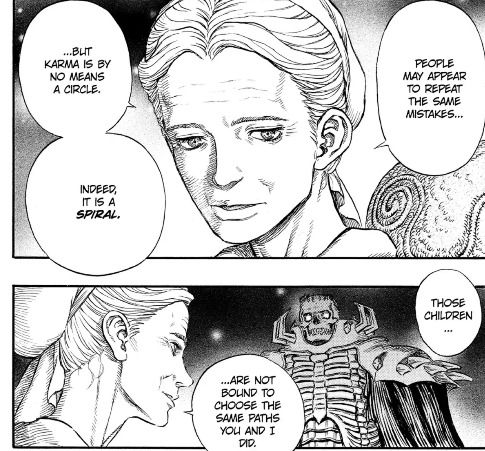
(Chapter 222, “Claw Marks”)
Some sort of do-over seems both narratively and generically necessary here – Griffith has been operating since their second duel under a mistaken belief about how Guts felt about him all along, and Guts has the key to fix it.
If the narrative ended without righting that mistake, undoubtedly in the most juicy, melodramatic circumstances possible (e.g., perhaps it would be too late to matter as both are poised to die anyway), it would be both narratively unsatisfying and incomplete. This mistaken belief – that Guts never loved Griffith – lies, after all, at the heart of the story, it’s what made everything go wrong in the first place. Narratives about misunderstandings must correct them for the emotional payoff, I think it was simply a matter of when it happened and under what circumstances.
Part 2, On Foreshadowing: There Are Lots of Interesting Parallels Between Pre- and Post-GA Berserk, OK?
One idea for how this narrative resolution might have gone down I’m also taking from a non-directly G&G related plot beat in post-GA Berserk.
Now, we all know about the explicit and more subtle (read: gay) parallels between Rosine/Jill and Griffith/Guts drawn throughout the Lost Children Arc. But what if I were to suggest that the final note of their relationship, Jill throwing herself on top of Rosine, might have offered a thematic parallel to Griffith and Guts at the end of the story? Perhaps Guts might do the same in a moment of love and pain:
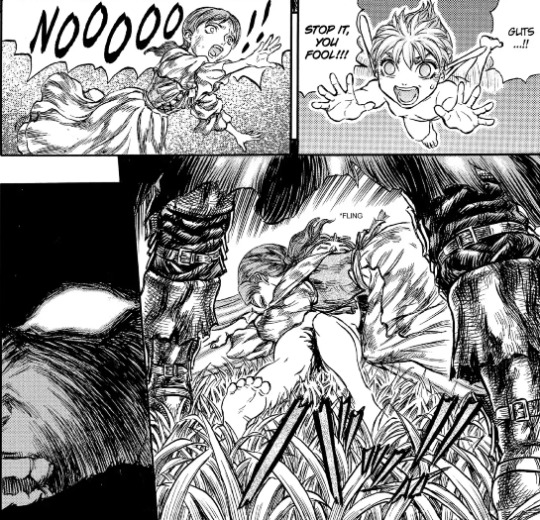
(Chapter 116, “The Way Home”)
This hope and a prayer (i.e., super amazing thematic prediction that isn’t based on any concrete evidence whatsoever) would have been a neat conclusion for the story, tying together a bunch of story threads in an incredibly simple and elegant way:
The narrative misunderstanding/wrong at the heart of the story (i.e., that Guts never loved Griffith) would finally be finally put right
It provides a neat resolution to both Griffith’s and Guts’ character arcs
The parallels are on point
To expand on this, in terms of character arcs, on Griffith’s end, a moment like this, perhaps where Guts bodily protects Griffith from a killing blow, would finally allow him to correct his fundamentally negative and damaging view of himself that has defined his entire character arc, the view that has led him to believe that he should bury himself under self hatred and repressed desires. Because if Guts sacrifices himself for him, it would not just tell but show Griffith that he was in fact loved all along. This act would finally provide him with a genuine sense of self and self worth through a love that is entirely reciprocated (instead of through dreams: either selfishly or selflessly pursued).
This would be incontrovertible evidence of Guts’s love for him; one of the main problems in resolving this narrative misunderstanding is to create a situation where Griffith can actually believe that Guts’s expression of love is genuine – how can he possibly believe this through anything other than an extreme, incontrovertible act? And so I offer Guts sacrificing his life for him.
On Guts’s end, it would finally allow him to take his life into his own hands and truly self actualize – he’s been passively reacting for most of the story, and this would be a chance for him to actively do something, to finally make a meaningful choice, and it would be an act that would allow him to unburden himself of hatred, regret, guilt, etc. It would also fulfill what I think of as one of Guts’ most deeply held personal values and beliefs – his desire to save someone through an act of love rather than through his sword (and yes I read Guts as fundamentally a caretaker at heart, more on this below).
In terms of parallels:
The theme Berserk often returns to about the merits of being with someone v. the burden of “protecting” someone would finally be resolved with Guts (likely) failing to protect his loved one, but also in doing so finally being with him in their (likely) dying together and finally fully coming to an understanding of each other.
Guts realizing that his life can mean something outside his sword (what he’s been looking for his whole life) – basically becoming a shield instead of a sword at the end of the story.
Griffith’s sacrifice at the end of the GA would finally be mirrored by a reciprocal act by Guts in the form of a second sacrifice, but this case one that is born out of love instead of hate. This idea in particular I need as a reader so badly, particularly because the acts they each took on behalf of the other across their relationship are so uneven – Guts has just been so passive overall and as a reader it would be incredibly satisfying to have him take up his role as the protagonist and take the final, decisive action to resolve their relationship. This is also why I can’t get on board with any resolution where Griffith has to take another action “for” Guts – imo the resolution of this arc should rest on Guts’ shoulders.
Basically, it would give both of their lives meaning in one swift move.
And what’s especially neat about this potential conclusion to the story is that I think the story gives us some really provocative small moments that foreshadow it, where we're shown that love can triumph over hatred.
At least some sort of reconciliation/act of love comes up again and again in the story, though in seemingly unrelated situations that imo just have too much in common with Guts/Griffith to dismiss outright. There’s of course the “karma is a spiral” moment and the Jill & Rosine parallels that I’ve mentioned, which suggest that it’s possible to still right a deep-seated wrong, to “save” (at least emotionally, if not physically) someone who has fallen into darkness through an act of love.
But there’s also the idea of saving one’s “other half” “from being torn to pieces in the storm” via Serpico and Farnese:
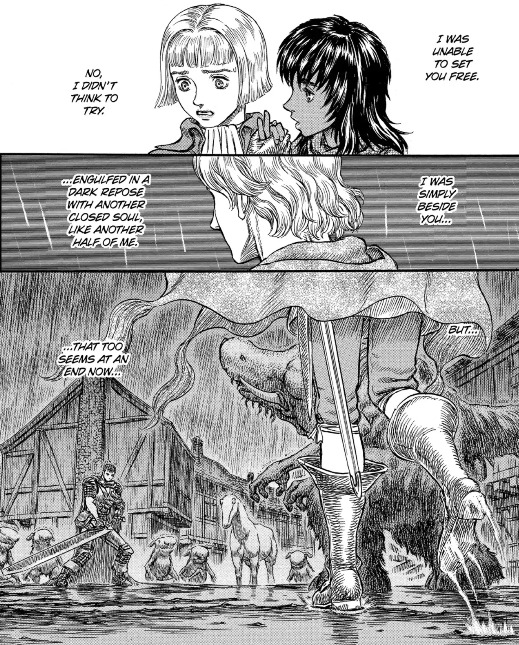
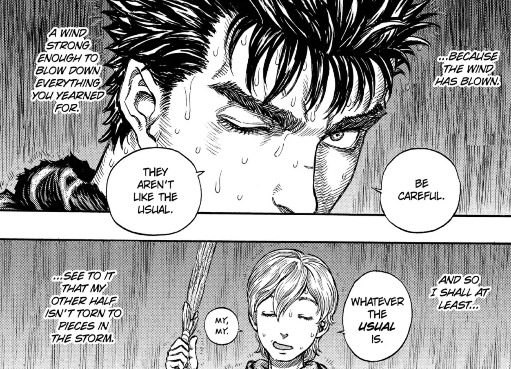
( Chapter 211, “Evil Horde Part 1”)
God, this passage. First off, I think Guts and Griffith's relationship is being explicitly paralleled through the word choices (“other half”/”half of me”), but also because this sentiment is basically echoing all of Guts’s paralysis and helplessness at the moment of the Eclipse.
Like Serpico, he too was unable to set his loved one free from a prison of darkness and hatred, something perfectly visualized in Guts trying in vain to pry his way in to Femto’s eggshell – as well as all the regret, hatred, and feelings of impotence (i.e., the darkness) that came along with that failure.
The “I didn’t think to try” aspect to this is also relevant and interesting given the changed context of pre- and post-Eclipse G&G. Guts during the GA didn’t see what Griffith was going through as leader of the Band of the Hawks as being a prison, a burden, or damaging to his sense of self; he simply thought he was “flying alone” above all of them but couldn’t conceive of how personally devastating that was for Griffith. Now though, after Guts has taken up the mantle as the RPG group leader, he’s probably in a better position to understand this and to also understand that something better is preferable for both of them, even if it seems like it’s forever out of reach.
And yet Serpico’s statement seems to be a really significant idea in light of all this – it’s suggesting that maybe this dilemma isn’t over – that maybe Guts can still see to it that his “other half isn’t torn to pieces” in some new storm that’s brewing.
I also submit Case B: Luca and her tribute to “the chick [child] that died within the egg”… Now, while she’s specifically addressing Eggman throughout this scene, this moment also explicitly parallels Griffith as a similar child who died within an “egg.” Compare:
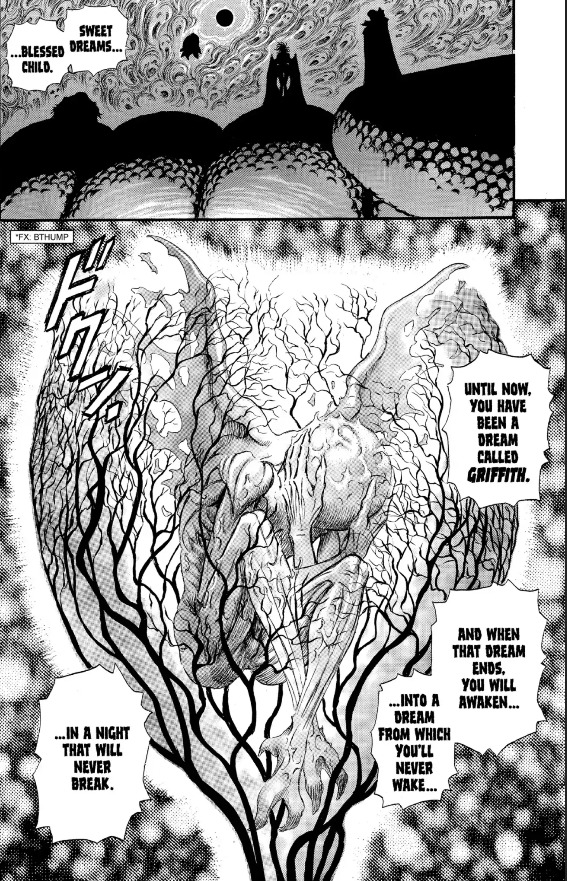

(Chapter 83, “God of the Abyss” and Chapter 176, “Determination and Departure”)
This is a “sinner’s” tribute to a child who died too young, who is now buried and alone, who has no one to love or mourn him. Again, I think the parallels to both Griffith and Guts are there, telling us that even those people who have done terrible wrongs, who have lived shameful lives, can still be loved (i.e., mourned), and that trauma does not have to define you or your legacy.
And this connection doesn’t just appear through the language choices (sinner, chick) but also through mirrored imagery between the above scene and these ones:
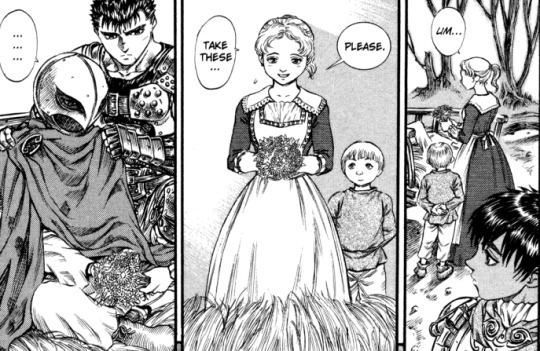
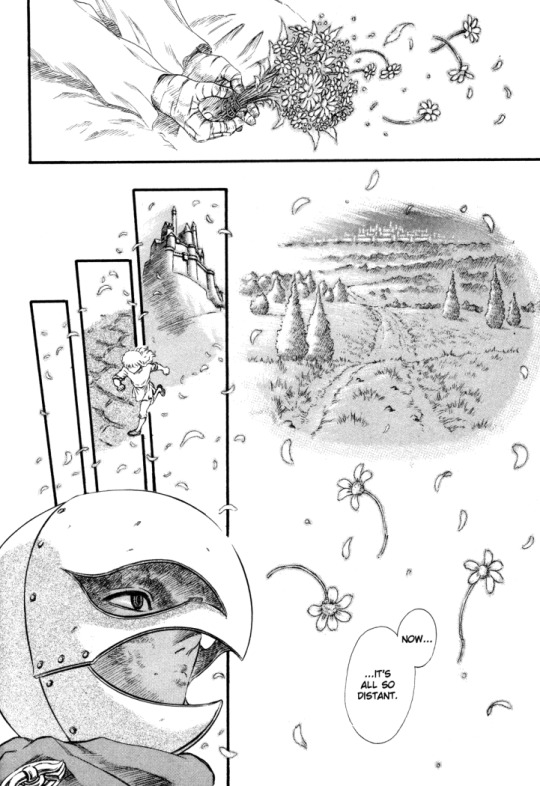
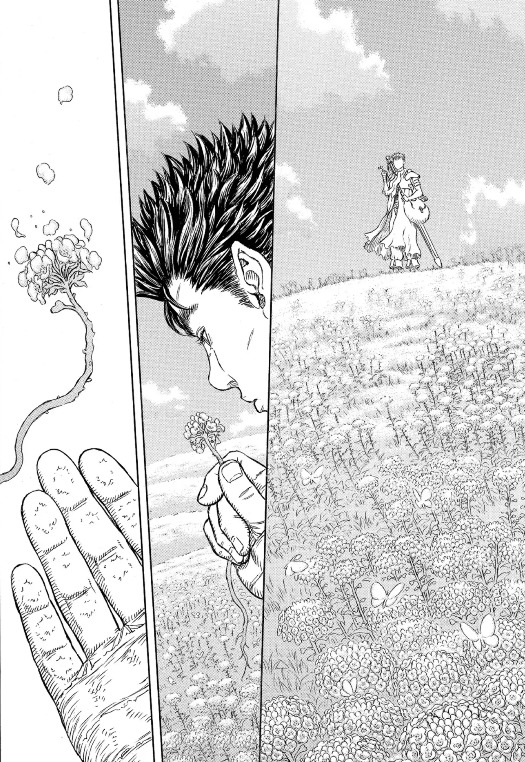
(Chapter 59, “Devil Dogs Chapter 1” and Chapter 331, “Spring Flowers of Distant Days Part 3” although admittedly the latter one comes much later, so it only works as a retroactive parallel)
The essential thing that Luca’s tribute is telling us as readers, is that in mourning (a form of love) someone evil and despicable, love offers the counterpoint, specifically the remedy, to hatred.
Part 3, On Narrative Conclusions: Why a Second Sacrifice?
So, my dumb little brain is telling you that the conclusion of the story should have been a scene where Guts makes a sacrifice for Griffith. But why?
Well, most importantly I think it offers a crucial structural parallel to the other sacrifices we've seen throughout the story. That's because there are some important distinctions to make between this sacrifice and earlier ones. This sacrifice would not be with a behelit. It would not be the consequence of magic or the gods meddling, the strings of fate, or an action born of hatred. It would not be a sacrifice that destroys people but instead one that actualizes them.
I think this is the best possible ending to the story, in large part because Guts demonstrating his love for Griffith is what was been set up to unburden both of them from their current armours (see: Femto) of imprisonment and their respective “shackles” of hatred.
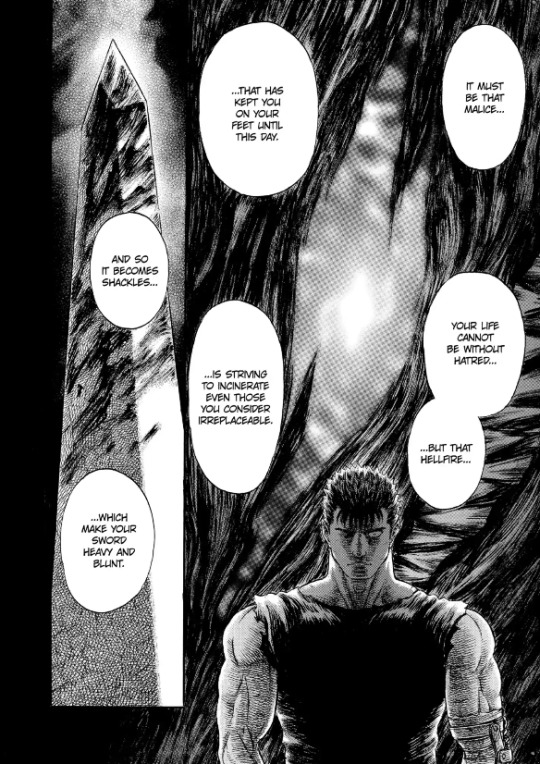
(Chapter 202, “Magic Stone”)
Now, on a character level I think it would be overly simplistic to say that the story is telling us that Guts will forgive Griffith. I think both characters too far gone for simple forgiveness between the two of them, I don’t think that was ever a realistic outcome to their story.
What they need instead is shared understanding and a shared declaration of love to help them realize who they are as people (loved and worth loving). That's why I think the Jill/Rosine parallel works so well, because it only needs to be an irrational action on Guts’s part (like throwing himself in front of Griffith to protect him) as a definitive expression about what Guts wants to do, outside of his usual waffling as well as any obligations or duties he might feel. A sacrifice by Guts would be a simple action, one taken because of him following his heart.
Guts making a genuine sacrifice for his “other half,” to save him, to finally know himself and know another person, creating a deeply honest a connection through an expression of love… tell me that’s not a perfect conclusion to a story about trauma and its devastating impacts on people and their relationships with each other.
Because I think it’s clear that the idea of not being able to truly hate Griffith is just as relevant to Guts as it is to Rickert:
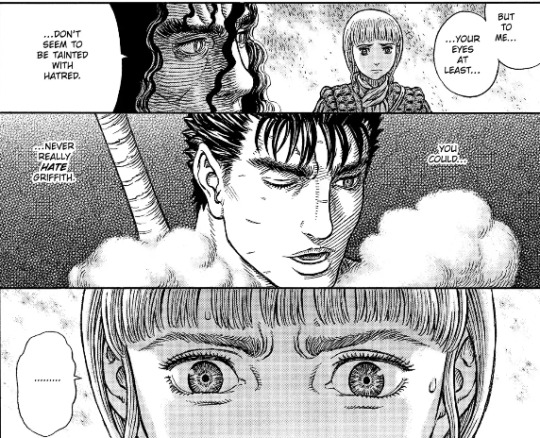
(Chapter 336, “Pandemonium”)
Guts says this to Rickert while looking sad, not angry. Maybe, just maybe, Guts is aware of his own feelings on the matter too. Perhaps he's as much speaking aloud as to himself here.
The wrench in Guts’ desire for that all-consuming hatred is, of course, that residual love he feels, the structural equivalent to Griffith’s own bthumping heart. In that light, that love could very well make Guts do something spontaneous and irrational, essentially bursting through his own darkness to definitively break the hold of the hatred that’s shackling him. Especially if he somehow comes to understand the pain and love that Griffith is still feeling too.
Now to be clear, I don’t think forgiveness necessarily needs to come into the equation here, and I think it’s psychologically reductive to say that Guts can overcome his trauma this way. I think those wounds run too deep, but conversely I think that his love does too. Basically I think the resolution to their arc absolutely could and should have remained messy as fuck. An act of love born from a crippling wound is as honest as it gets for these characters.
Now, the narrative explicitly tells us after it declares that Guts is shackling himself to hatred through his sword, that that the way Guts will go about this unburdening/unshackling of his hatred is through Casca, by taking up the sword for her sake as a “protection against hellfire” AKA as a protection against his own hatred:

(Chapter 203, “Elementals”)
But we see repeatedly that this is simply a “path [he’s] chosen,” not necessarily the only path or, indeed, necessarily the correct one. In fact, we see that this path is not actually succeeding at protecting him or Casca from anything. And that’s because when we look at Guts’s actions, he isn’t actually working to protect himself from his own hatred, because he can’t help but be reminded of his own trauma as a result of Casca’s trauma:
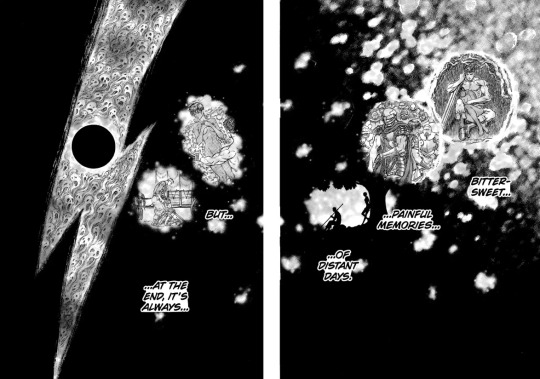
(Chapter 287, “Bubbles of Futility”)
“At the end, it’s always.” Trauma lies at the end of this road named Casca. And I think that’s because Casca is no longer really an independent person to him; she is a symbol, a burden, and a force that keeps The Struggle alive; she’s a means, not an end in itself. At the end, instead, it’s always that wound, and purposefully so. (And this interpretation is of course aided by her being a veritable doll throughout the majority of the rest of the story).
The Struggle and Casca herself aren’t presented as what Guts objectively wants as an end consequence of his actions – they are presented as the means towards something else.
The story drills into us the idea that this goal of restoring Casca is based on neither a positive and altruistic motive on Guts’ part, nor is it something that’s destined for jolly good things. See: the ominous foreshadowing with “The power to protect someone and the power to be with someone are different,” “fixing” Casca despite her own wishes, and Casca also seeing Guts as a monster from the Eclipse in her own right. In this light, I think it’s very appropriate that Casca views Guts in exactly the same way:
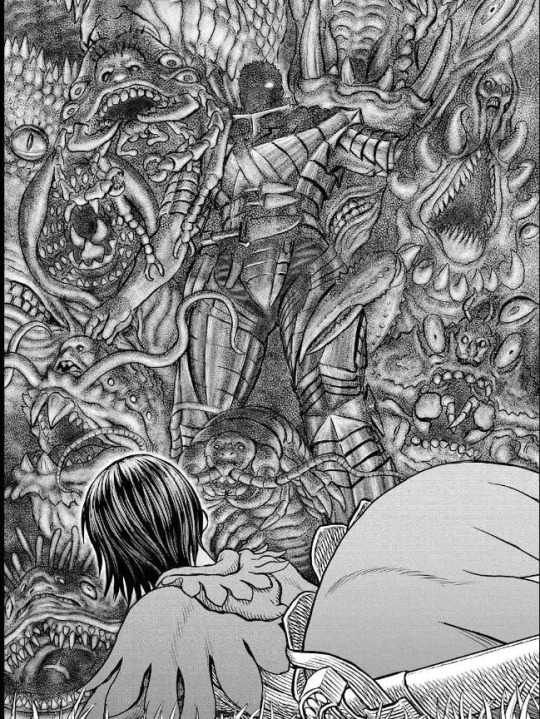
(Chapter 359, “A Wall”)
The “path [he’s] chosen” – The Struggle, the burden, the guilt, or everything that Casca is to him – isn’t good for Guts. It’s a path shackled, and it’s one that makes his sword heavy with guilt, anger, and hatred.
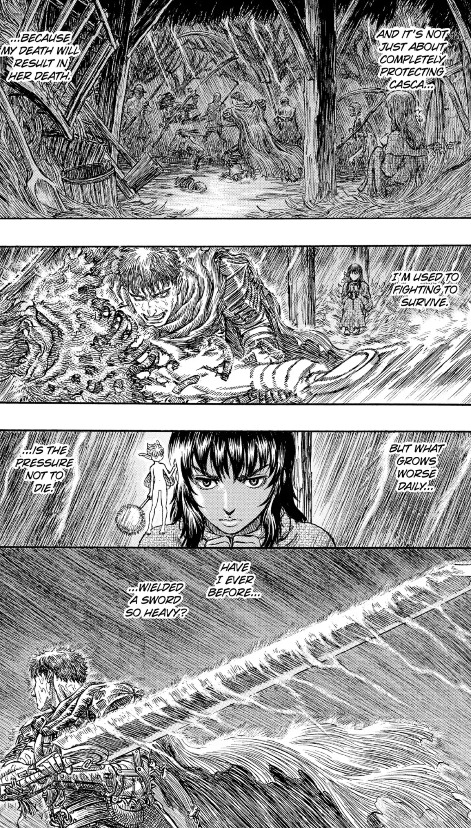
(Chapter 188, “Winter Journey Part 2”)
But we’re told that this isn’t a path that’s been set in stone (re: “those children are not bound to choose the same paths you and I did”). Guts has the power to choose differently than continuing to fight as a sword.
To sum up, I read Guts as explicitly thinking of Casca as a duty/chain/burden rather than as something personally fulfilling or as a genuine escape from his hatred. At the end, it’s always. And that’s why the conclusion to his story, at least imo, should lie somewhere else.
(And sidenote, this dynamic between duty and desire (giri and ninjō) is a huge part of the Japanese cultural (literary, dramatic, and cinematic) tradition, and I think it’s pretty clearly at play here, where Casca represents duty, Griffith represents desire).
To me, this is the whole point of Guts still being “bound” to Griffith, because in his heart of hearts, he still wants to be, because can’t ever truly hate Griffith, because he’ll always love him/be in love with him. And accordingly, any act Guts takes for Griffith at the end of the story will not happen because he feels obligated or burdened, like he does with Casca, but because on some level he genuinely wants to embrace love and be free of the burden of his Struggle and hatred.
~~
Small tangent on Guts: the question of what Guts actually wants is obviously crucial to the story, he’s the protagonist after all. But what does he want? To save Casca? Well, he did his part there. What now? To live with Casca? Continue The Struggle? To kill Griffith? Honestly, this question is actually really fucking ambiguous, which is kind of shocking for a protagonist (supposedly) three-quarters of the way through his story. (My headcanon reason for this ambiguity is that Miura wanted to maintain plausible deniability that this story is gay AF, which is also the reason behind Griffith’s motivations being so ambiguous as well).
To make this question a bit more abstract, if Guts was free to do whatever he wanted – as in, if he didn’t feel obligated to do what he’s supposed to – what would he do? If we can’t answer that question, I think we can’t truly understand Guts as a character.
My own answer to this question lies in reading those moments we see him as a caretaker as the most genuine senses of who Guts is as a person.

(Chapter 1, “The Golden Age”)
Those desperate moments of grabbing his mother’s hand as well as him trying to return the flower spirit to its home are the moments I think he is acting in line with the person he genuinely wants to be outside of any expectations of what he thinks he’s good at or what he’s “supposed” to be, or in terms of obligations in trying to impress someone or doing what he thinks is expected of him… He just does these things instinctively, because I think fundamentally he’s a loving person who essentially just wants to be loved back.
These moments are especially important to highlight I think, because in these moments Guts has no external motivating factors. He is a child who loves his mother, who wants to reassure her and be reassured in turn; he is a young man who wants to repay an act of kindness out of genuine good heartedness.
I will submit also the following, as a pretty clear crystallization of what Guts is about:
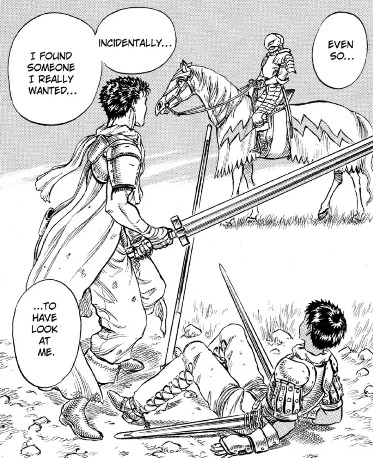
(Chapter 33, “One Snowy Night”)
If he ended up sacrificing his life for Griffith at the story’s conclusion, it would be exactly in line with this same impulse: to love and be loved. This is what has always, at least imo, defined Guts beneath all the shame, and rage, and guilt, and shackles of duty, and his feelings of inadequacy.
In becoming Griffith’s shield, he wouldn’t be protecting him through his sword, he would be saving him through an act of love.
~~
And OK, what I see as the smoking gun for this weird little theory comes from this very innocuous page from a random, seemingly unrelated story thread and chapter.


(Chapter 206, “Troll Raid”)
This page is framed in such an aesthetically significant way – a full page spread given to such a small line, like why unless it’s about more than some random townspeople.
The key that saves us lies in those we are trying to forget.
Guts has been trying to forget Griffith, to move on, for basically half of the story – this line very easily could be read as directly commenting on Guts’ journey and his inability to unburden himself.
BUT this line goes further – it’s not only suggesting that Guts trying to forget his past is not a good thing, it’s also suggesting that Guts needs to be saved somehow, and that it can happen through the one he’s “trying to forget.”
What does Guts need to be saved from? Well, from the burden of The Struggle, from berserking, from his sword, his regret, his hatred. And how can he do this through Griffith? By giving his love/life to him, as a shield instead of as a sword… It’s just too perfect!@!
So yeah, while this is all entirely wishful thinking, I also don’t think Guts sacrificing his life for Griffith is totally unreasonable or “out there” spec – I do legitimately see this as a once-possible and honestly pretty perfect ending to the story. So that’s what I’m fucking going with, goddammit.
Part 4, Conclusions
Imo Guts making a sacrifice for Griffith would be the most important theme Berserk could ultimately endorse – because, in my reading at least, Griffith has entirely defined his choices around the belief that he does not deserve absolution (reminder: I think he ultimately made the sacrifice because the Godhand convinced him there was no coming back from what he already was, and so as a result he doubles down on that belief by agreeing to the sacrifice). For someone who believes that he isn’t worthy of love to be loved nonetheless, outside of those cycles of worth, exchange, and self loathing that he is so bound within, that would be a pretty damn powerful message. And for a character who is defined by his trauma to decide that love is ultimately more important? That's what I want from this story.
And as I noted above, on a character level, I can absolutely buy that Guts would make a sacrifice for Griffith, because I read this as being in line with Guts’s most fundamental desires as a person, and because I think Guts feels personally responsible for what happened to Griffith and still desperately wants to right that wrong, he just doesn’t know how to do so.
However, on a broader narrative level, I think this is more difficult to make a case for because to a lot of readers Griffith seems beyond redemption.
And honestly I think if Miura had wanted to do a classic redemption arc, where Griffith comes to realize that he regrets his original decision to make the sacrifice (as in a reading where he chose the dream and has now come to be dissatisfied with his current situation), this arc would have started long ago and it would have been made abundantly clear to readers.
If Miura had been gearing up for Griffith to come to realize that he did the wrong thing and eventually at the end of the story planned to have him take another action on Guts’s behalf to redeem himself, I think for a turn like this to work effectively, his emotional state wouldn’t still be so ambiguous to us – Miura would have been showing us his incremental but explicit realizations that this is not in fact what he wants in order to get us to root for his redemption. If Miura was in fact headed in that direction, it just seems like it was too little too late at this point.
OTOH, though, if Griffith already knows what he did was wrong, as with my reading, then the thing he needs to come to understand in order to be redeemed isn’t that he made the wrong choice, it’s that he doesn’t have to hate himself. And for that, he needs to be told that he is loveable, and indeed, is and was loved even at his most despicable. It’s Guts’s love he needs, narratively and emotionally, and such a realization could come right at the very end of the story, no build up on Griff’s end necessary.
To put this in slightly different terms, Griffith’s redemption involves him coming to realize that the sacrifice was the wrong choice, but not because he realizes he never actually wanted the dream after all, but because he comes to realize that he never had to punish and hate himself for all his prior actions, because he was loved all along – that his sacrifice/act of suicide was wrong because it was never “necessary” in the first place.
Basically, whether he’s chosen the dream or the sacrifice yields different stakes for Griffith’s redemption – they hinge on fundamentally different things, and I don’t buy that the first one was possible given post-GA characterizations, but the second seems not only possible but necessary to bring this interpretation of the story to a satisfying resolution.
And I think there are different scales of redemption that are possible to admit here. But I do think both Guts and Griffith need some sort of redemption for the story overall to be satisfying – they’ve both done atrocious things, but the story has also expressly shown us that neither of them are a lost cause.
Both are still fundamentally broken, vulnerable, and fragile people; especially because both still need each other, after all, they’re both still in love with each other. This isn’t the characterization of people who are fundamentally beyond some kind of redemptive final act(s). It also helps that Griffith is basically treated as a deuteragonist post-Conviction Arc.
And ultimately I think Miura has shown us that this is a state that the apostles/“monsters” of the story all have in common. I’m thinking here of this moment we see at the very beginning of the story:
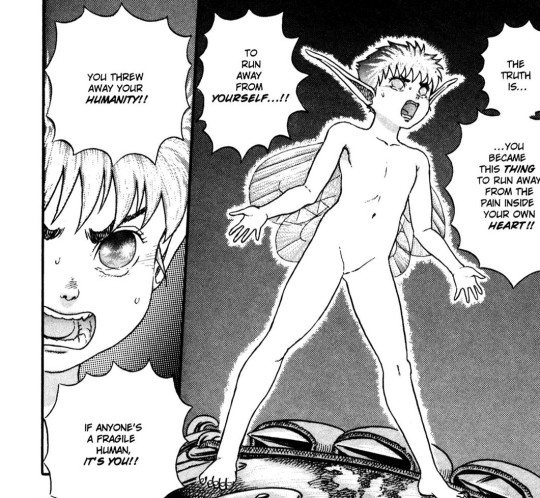
(Chapter 4, “Guardians of Desire”)
As Puck says here, apostles are very much still fragile humans. The most fragile, in fact. Their deformed bodies are proof of their having broken themselves. The clearest demonstration of this is of course Griffith, who as an apostle became what he always hated. These are “fallen” people, unloved, hiding from themselves and from the world. If that’s not someone who is in need of mercy and redemption, I don’t know who is.
As to whether both Guts and Griffith still need to “pay,” narratively and morally, for their actions, this is not something I have a strong personal opinion about – I think both of them have already suffered hugely. That being said, I do think a second sacrifice narratively should lead to both of their deaths at the end of the story. That’s for two reasons, one because I think they both would both probably view death as a release more than anything, and two because it would function as the narrative consequence for their actions, especially if they were to get taken out by Apostle!Casca, who has also suffered hugely at the hands of both of these men.
Death would be what finally frees both Guts and Griffith from their pretty fucking miserable/doomed lives and would finally provide them some kind of peace as well as self-actualization – in that sense Casca’s actions could be read in the mode of both mercy and vengeance. So that’s why I lean in that direction, but then again I’ve always been more interested in mercy/forgiveness/redemption as story tropes than revenge/punishment, though I think the story was set up to be able to balance both in a really interesting way.
Anyway, I hope you enjoyed my senseless ramblings. If I had my druthers this is how the story would have ended, and I guess it gets to live in my headcanon forever, and maybe yours too if you like my interpretation of the story.
Sorry for any of you who were waiting for another post from me – the news of Miura’s death really kept me from thinking about Berserk for a while, for obvious reasons. But the story is what we make of it, especially now, so I hope this maybe gave you a bit of solace too.
As always, feedback, discussion, etc. is welcome.
#since it's all fanon now i figured why not throw my hat in the ring#yes im hating the continuation series#also I've been sitting on this post for literal years#how did that happen seriously wtf#this post has been about gay stuff#as per usual#berserk#berserkmeta#berserk meta#griffith#griffith meta#and even some#guts meta#!!!#im really branching out
138 notes
·
View notes
Note
Griffguts for 002
Tysm!
002 | Send me a ship and I will tell you:
When I started shipping them:
Surely pretty much immediately. I watched the anime first and while I don't remember much about that viewing experience, I know myself and I know I would've been like 'okay these two dudes have an intense relationship so that's what I'm gonna be focusing on.'
My thoughts:
It's the best lol, it's just so good. Amazing tragedy, amazing potential, amazing vibe, amazing friends to enemies dynamic, amazing aesthetic, amazing tropes... and the story really sells how their relationship profoundly affects both of them.
What makes me happy about them:
How good the tragedy is! Griffith escaping his feelings through the sacrifice, Guts abandoning him because of his low self esteem, Griffith throwing his life away, Guts staying in denial as long as possible... There's nothing that makes me happier than a story about people who make incredibly bad choices for very undertandable reasons thoroughly rooted in good characterization.
What makes me sad about them:
The fact that it'll never be finished, at least not by Miura. I wanted a cathartic final confrontation so bad omg.
Things done in fanfic that annoys me:
lol there's not a whole lot of fanfic to get annoyed by, but I guess I'll say possessive/dommy/yandere/etc Griffith. I see where it comes from superficially but it's not my thing and I don't think it actually fits his character at all.
Things I look for in fanfic:
hmm... I don't read too much Berserk fic so this is hard lol. Obviously takes on the characters that fit with my own opinions. I like bittersweet missing scene Golden Age stuff a lot in theory, or AUs where Guts never left, or darker post-canon stuff.
My wishlist:
They have a moment of understanding in which they both realize they actually could've had it all and they threw it away and they'll never be as happy now as they could've been, then they kill each other in a homoerotic way and die fulfilled, and thematically this is reflected in some grand shift in the world. Basically their past relationship is vital to the overall happy ending of Berserk even if they don't get to live happily ever after.
Who I’d be comfortable them ending up with, if not each other:
I otp them hard. For Griffith the answer is loveless empty marriage and a subtle yet profound sense of loss, and for Guts the answer is Serpico but only like, from the thematic angle where all of Guts' problems come from gay repression lol.
My happily ever after for them:
I actually wrote it! Basically Guts and NeoGriffith get back together, Guts having destroyed everything and everyone and become a monster for a while, and NGriff having accepted that he failed to get rid of his feelings so he'd better find a liveable plan B so he can at least preserve his goals and life this time. They become roving fantasy heroes/monsters together. Or maybe they kill each other one day. It's up in the air.
29 notes
·
View notes
Note
Do you consider it strange, that Neogriffith became even more feminine than the original human Griffith? Whenever I look at him in the newer version, I do think...That is basically a woman´s face right now and that was not yet the case with human Griffith. Do you think this could be partly intentional or is it merely a change that occur due to time and change of production?
I don't think it's meant to be understood as a difference in Griffith's actual physical appearance. I think it's an evolution in Miura's art style. Miura drew Griffith as incredibly pretty during the Golden Age as well, but his looks varied a lot more. But imo he did tend to get more consistently pretty as the arc went on, til the torture. He also looks very pretty in flashbacks to the Golden Age, eg:

Here's him looking super feminine in chapter 2:
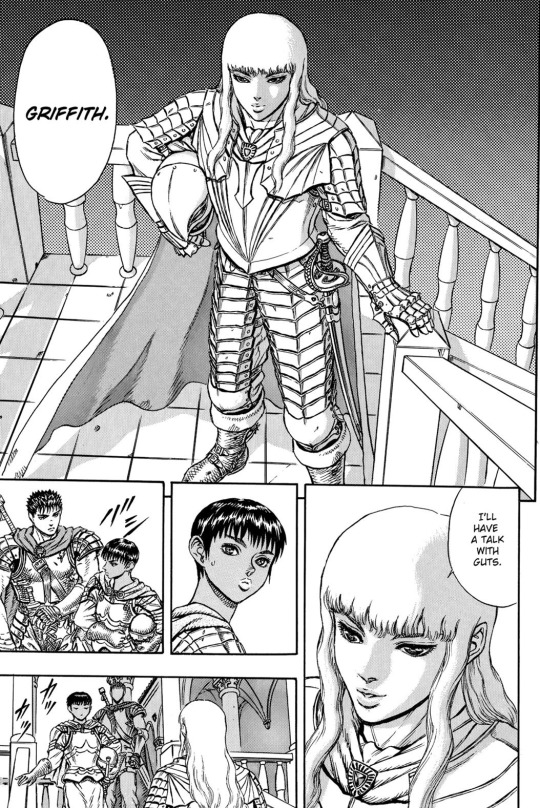
And here's an example of him looking extremely feminine in one panel, and then less so in the next, in chapter 9:
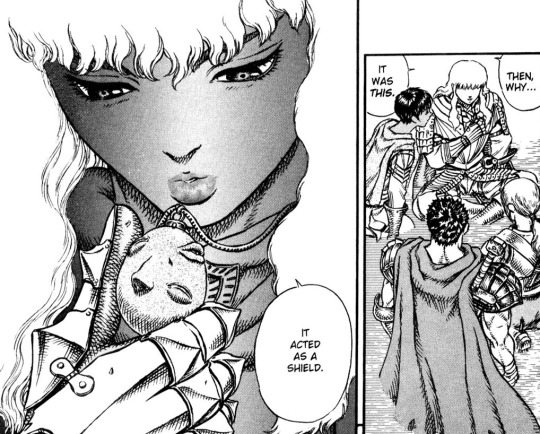
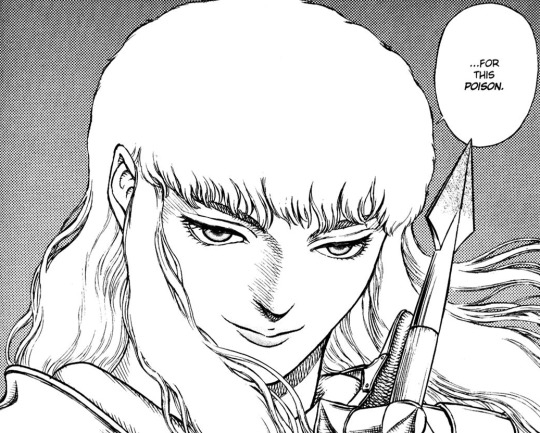
Now I have made the argument that Griffith looks extra pretty from Guts' point of view (using those images as an illustration in fact lol), so I think you can definitely make a case that NeoGriffith looks pretty because he's "more Griffith," as someone (I think Owen?) says at one point, and he's embodying the impression he used to leave people, including Guts, with. He's personifying desire, to an extent.
Buuut I kinda think that's a happy accident that happens to fit the themes lol. I think Griffith's shift in appearance is just a lot more noticable than, say, Guts', because we didn't see him for like a hundred chapters between the Golden Age (or really, him getting tortured, since that kinda put a damper on his prettiness) and the Millenium Falcon arc.
But I don't think he's meant to look different. Guts specifically notes that he looks exactly the same as he did as a human when he first lays eyes on NeoGriffith:

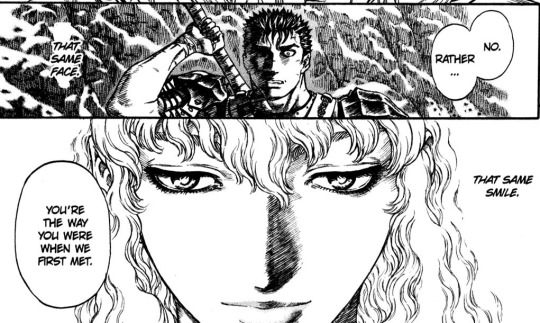
Anyway, yeah, I don't think it's a deliberate choice to make him more pretty as NeoGriffith, and in-universe I don't think we're meant to understand that he got magical plastic surgery - at best I think NeoGriffith probably looks like human Griffith on his best days, every day - but I think the art does nicely emphasize NeoGriffith's existence as the image Griffith used to try to project.
Thanks for the ask!
34 notes
·
View notes
Note
do you think that Neo-Griffith remembers him being tortured? i feel like this part is very important, but not everyone seems to care much about? he did spend the entire year in the torture chamber, cause of that it's very hard for me hate him, if at all
Yeah, I feel like fandom does have a tendency to downplay the whole year of torture he went through, which I guess makes sense because I think part of the point of the torture is to make the eclipse sacrifice even more of a sympathetic and understandable choice, and a lot of fans don't like that lol.
And yeah I definitely think NeoGriffith remembers the torture, though I don't think he's currently emotionally affected by it. I imagine that the trauma was frozen along with most of the rest of his human feelings, almost as if it happened to someone else, maybe. Though I do kinda headcanon that NeoGriffith still has feelings, he's just on godmode levels of repression, so if that's the case then maybe the trauma is still there, but very thoroughly buried.
Thanks for the ask!
27 notes
·
View notes
Note
I'm sorry about the confusion. By chapter 364 book 42, I mean this. griffith met guts again . he tears come out. want you to analyze whether he still has feelings for guts?
Ohhhh, yeah that makes sense, thanks for clarifying!
I definitely think those tears were a sign of his feelings for Guts not being totally erased, and NGriff in denial about it, rather than the Moonlight Boy's residual feelings. He describes it as a nostalgic feeling, which makes sense as a reminder of his human life. Moonlight Boy has no reason to feel nostalgic.
And I think there are a lot of reasons to assume that NeoGriffith still has feelings towards Guts, and I have a few posts about that if you're interested in a broader answer that incorporates more of NGriff's narrative.
Here's a post on why I'm sure Griffith still has feelings for Guts
Here's a post about how the narrative essentially revolves around Griffith's feelings for Guts
Griffith and loneliness
More on griffguts and loneliness
Here are two posts about the scene between Griffith and Rickert and how it reflects on Griffith's emotional state.
My theory on how those feelings will come into play at the climax of the story
Long story short, I think Berserk makes no sense thematically and as a coherently structured narrative if NeoGriffith doesn't still have feelings for Guts.
Thanks for the ask!
22 notes
·
View notes
Note
Hello! There is a question that has been tormenting me for a long time. Do you think Griffith is now (as of the recent chapters) a worse person than Griffith in the Golden Age? Or are they the same? It just seems to me that Griffith has lost some of the humanity he once had. But then, how do you explain the moment with the tear in Chapter 364? I can't understand what's going on in Griffith's mind now and what he plans to do. I can't grasp his emotions, which is why his actions seem chaotic and impulsive to me. Could you please help me piece together this puzzle into your perspective? It would be very interesting to read what you're going to say on this topic.
The short answer is we just don't have enough information to know yet.
My favourite theory is that he has at least enough lingering humanity for him to feel emotions, and him denying it is basically the same as what human Griffith always did, eg in the river scene with Casca. "I'm fine I don't have feelings I'm a being of pure ambition" etc and he's even better at telling himself this now, on account of being a demigod, but it's not true.
I think the most plausible explanation is that he did change emotionally when he transformed into Femto, which we essentially saw happening as he transformed and lost pieces of himself and found himself surprised that he doesn't feel anything about the Hawks dying. And he's probably still changed as NeoGriffith, but with lingering emotions for whatever reason - because the fetus/Moonlight Boy infected him with humanity, because some sacrifices survived, because that's just how being a demon works, whatever.
Some people think that the tear is 100% from moonlight boy bodysharing him, so it's moonlight boy's feelings. I think that's what Griffith is trying to tell himself.
I have a few posts that go more in depth on theorizing about Griffith's current emotional state:
headcanon about NeoGriffith not being significantly different from human Griffith
analysis of the scene with Rickert and NeoGriffith
why I think NGriff still has feelings
Griffith Ganishka parallels
the fetus
loneliness
Thanks for the ask!
24 notes
·
View notes
Note
What does it mean when they say Griffith fulfills the wishes of mankind or is a representative of mankind?
The Idea of Evil exists because of the collective will of humanity. Everyone's subconscious all added together is powerful enough to create an entity that can shape reality. It's basically the fantasy trope that human belief creates gods rather than gods existing independent of humanity.
So that collective unconscious of humanity which created the Idea of Evil/fate, because humans want something to blame for bad things happening, also de facto created Griffith, because the Idea of Evil brought him into being to fulfill humanity's desires.
We don't know what desires those are exactly - we can assume that Griffith creating Falconia is one of those desires. A utopian society, I guess. Freedom from tyranny, as Jarif puts it when he talks to Silat. But this could be building up to a twist where humanity's desires are fulfilled in a surprising way. The Idea of Evil tells Griffith he's fated to either save or doom humanity, but we don't know what that means either. Save from what, doom how? Could be saving them from tyranny, could be saving them from fate by impacting humanity so much that they no longer want the Idea of Evil and therefore destroying it, or it could be dooming them to an uncaring universe by destroying the Idea of Evil lol. It's very ambiguous right now.
But yeah like, basically everything Griffith does is something he was fated to do, in order to fulfill humanity's desires. So whatever he's doing is part of that. And we'll presumably find out what that means for humanity eventually.
Thanks for the ask!
#ask#lost chapter spoilers#anonymous#a#b#theme: speculation#theme: spirit world#theme: fate#character: neogriffith
28 notes
·
View notes
Note
Hi!! As I was reading old posts in this blog, I saw you briefly talking about Femto makeup and looks, and it catch my interest. I came to know about Berserk as a teen, through some anime magazines, and I remember thinking that Femto was VERY sexy. When I finally watched the anime, my interpretation of his appearance was that it's the first time he can be attractive without being vulnerable, so he embraced it to a extreme, even through his actions. Ngl, he is scary, but still hot to me, haha.
That's an interesting take on Femto's look! It does make sense to me, since a lot of NeoGriffith's invulnerability is pretty pointedly depicted as a contrast to human Griffith's sexualized vulnerability - eg Ganishka and Gennon as parallels in the way they threaten him, but NeoGriffith being completely untouchable while human Griffith was legitimately in danger. Or NeoGriffith having a hoard of monsters lusting after him but totally unable to act on it.
So yeah, while idk if that's the reason behind Femto's makeup job, it makes sense as an interpretation and I like it.
Thanks for the ask!
14 notes
·
View notes
Note
How was Rickert able to slap Griffith? Did Griffith allow himself to be hit? I don't know how to phrase the question correctly.
Either Griffith allowed it, accepting Rickert's judgement, or Rickert's rejection threw Griffith for such a loop that he wasn't prepared for it.
Both possibilities are interesting imo. If it's the first then it's a cool, chill and reasonable moment for Griffith where he accepts a consequence of his actions with grace in a way that at least belies the pure agent of evil interpetation lol, and could go as far as being foreshadowing for a final battle in which Griffith allows himself to lose for emotional reasons.
And if Griffith didn't intend for Rickert to hit him but he did it anyway it suggests that Griffith can be taken by surprise or his emotions can get the better of him, which could also be an interesting hint for how a final fight could go.
I have a few posts about that scene that go more into speculation about Griffith's emotional state and reaction, if you're interested in that angle. Here's one with a link to another.
Thanks for the ask!
18 notes
·
View notes